The 49th Japan Foundation Awards
―Building Bridges Across Differences― <3>
Korean Japanese Association - Award Commemorative Lecture
April 24, 2023
【Special Feature 078】
Special Feature: The 49th Japan Foundation Awards ―Building Bridges Across Differences― (for summary on special features, click here)
The Korean Japanese Association was founded in 1971 to promote friendship, goodwill, and mutual prosperity between Korea and Japan through academic, cultural, and youth exchange. For as long as 50 years after its foundation, the organization has focused on the area of Japanese language education, the foundation of mutual understanding between Japan and Korea, to carry out future oriented activities for youths.
Song Boo Young, chairman of this organization that has worked persistently to develop friendship and goodwill between Korea and Japan, even during difficult periods in the relations between both countries, gave a lecture on the topic of "Future Oriented Human Exchange" on "the new era in Korea-Japan relations."
The lecture is also be available on the official YouTube channel of the Japan Foundation.
https://www.youtube.com/watch?v=2NydRsgwm8o
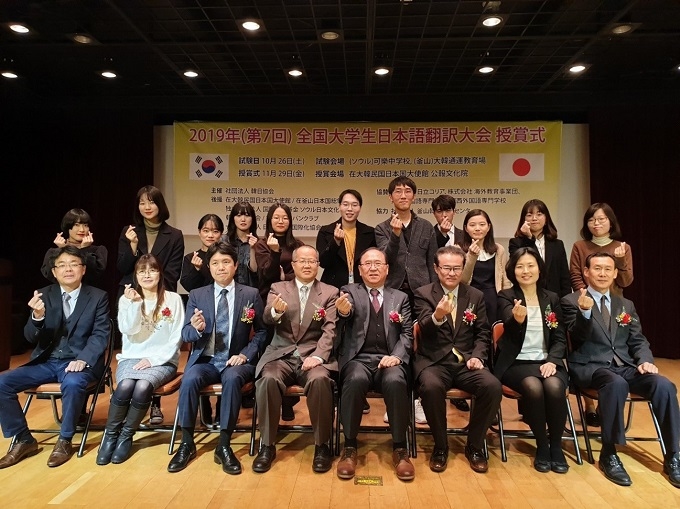 At the 2019 National University Student Japanese Translation Competition hosted by the Korean Japanese Association (photo courtesy of the Korean Japanese Association)
At the 2019 National University Student Japanese Translation Competition hosted by the Korean Japanese Association (photo courtesy of the Korean Japanese Association)
Thoughts on "Future Oriented Human Exchange" between Korea and Japan
Song Boo Young, chairman of the Korean Japanese Association
The arrival of a new era in Korea-Japan relations was frequently brought up in the media of both countries in the 2010s. Since that time, however, that new era does not seem to be developing as expected. This is perhaps due to a number of economic and political events and natural disasters. And this demonstrates how challenging international relations can be.
The new era in Korea-Japan relations is defined as "an age in which a complex network for coexistence is built through close cooperation between the two countries" in the Proposal for a New Era in Korea-Japan Relations (by the Joint Research Project on the New Era in Korea-Japan). The proposal also calls for "continuing to work to hold a shared understanding of past history while further developing the existing relationship of close cooperation and understanding the past, present and future organically and continuously in order to design the future of both countries together."
We, the Korean Japanese Association sincerely hope that Korea and Japan will go beyond the relationship of good neighbors and look further towards order in East Asia and globally by building a relationship of friendship and cooperation towards peace and prosperity. Given that one path to achieve this is wide ranging and deep human exchange between both Korea and Japan, we are engaged in youth exchange and educational exchange programs.
Today (October 21, 2022) I would like to speak about future oriented human exchange between Korea and Japan, while referring to the topic of "formation of human networks" from the Second Phase Report of "the Proposal for the New Era in Korea-Japan Relations" I just mentioned.
1. Korean Japanese human network challenges
Let us first take a look at the challenges to the human network between Korea and Japan.
Since "the normalization of diplomatic relations between Korea and Japan" in 1965, Korea and Japan have been recognized as leading nations among the non-Western regions behind the development and establishment of political democracy, advanced market economies, and pluralistic socio-cultural systems. And in 2018, the relationship of the two countries reached a landmark with over 10 million visitors traveling back and forth.
However, the truth is that Korea and Japan also face the following three challenges in terms of the human network.
The first is that the network in the political sphere is considerably weakened. Previously, when there were issues between the two countries, influential politicians worked behind the scenes, but now, major politicians capable of playing those roles have disappeared due to retirement and generational changes, so almost none are left.
To be sure, when one considers the multi-layered nature of Korea-Japan relations that steadily grows more complex, it cannot be denied that it is becoming much more difficult for a handful of major politicians to control all of the issues that exist in Korea-Japan relations.
Nevertheless, given the current reality at the political level, I believe it is time to establish a new network between the politicians of both countries.
Secondly, in light of the already diverse exchange taking place between Korea and Japan, I believe it is necessary to discuss a joint Korea-Japan vision, rather than simply expanding that exchange, and building a comprehensive human network to share and implement that vision.
If a comprehensive human network between Korea and Japan is built, then dialogue and cooperation will take priority over friction and conflict in the political sphere, resulting in groundbreaking progress in Korea-Japan cooperation that can contribute not only to peace and prosperity in East Asia, but throughout the world. In economic terms, it will achieve the free exchange of capital, information, technology, and labor between the markets of Korea and Japan in the short term, while starting progress towards an East Asian economic community in the long term.
And for that reason, it can be said that a new paradigm for human exchange between Korea and Japan is required. Today, when Korea has achieved both economic development and political democracy, it cannot be denied that they wish to interact with Japan on an equal footing. It is natural to consider a new paradigm for this new age.
To be sure, this new paradigm cannot be said to be particularly new because it has already been much discussed, but I would like to speak of my own idea of a new paradigm as it relates to the topic of today's lecture.
● Balance of intergenerational exchange
Firstly, there is a balance of intergenerational exchange. This is a point that cannot be overlooked because the younger generations, that observe each country through a completely different outlook, are living at the same time as the established generations that have guided the relationships between the two countries so far. It is the younger generations that should take the lead in achieving co-prosperity through cooperation for the future of both countries.
But at the same time, we must ensure that the older generations, which are increasing in numbers as populations age, also engage in adequate exchange. In other words, we must take care to ensure that each generation interacts with each other in multiple ways.
● Balance of inter-regional exchange
Secondly, regarding the balance of regional exchange, in light of the fact that exchange was primarily centralized between Tokyo and Seoul, we must expand the exchange between local governments, companies, and organizations in other regions as well.
Both Korea and Japan are moving forward with regional decentralization and local autonomy, and there are local governments that engage in economic exchange and have set goals for economic integration, such as establishment of sister city relationships, and this is extremely important.
One can often see a will to vigorously promote economic and human exchange and tourism on the part of local governments to achieve regional development, and I believe it is extremely important to leverage this trend to expand regional exchange between Korea and Japan.
● Balance of the timing of exchange
Thirdly, the balance of the timing of exchange that considers the achievement of both short term and long term goals is also important. Considering that Korea-Japan relations are easy to deteriorate on occasion, network development that can achieve short term results is important, but at the same time, it is difficult to see the results of human networks, and a great deal of time is often required for those results to come to fruition.
Therefore, it is important to set both short and long term goals, define a shared vision for both countries with a broad perspective, and put those into practice, rather than rushing to achieve results right away. The work of designing a joint vision for Korea and Japan is a much more difficult task than designing a 100 year plan for a single country. It is for that reason that we must demonstrate the will to do so now.
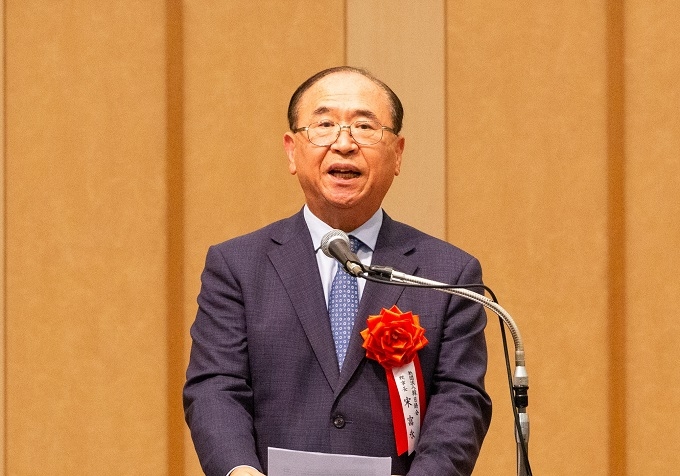 Chairman Song Boo Young giving a speech on receiving the Japan Foundation Award (photo by Stage Incorporated)
Chairman Song Boo Young giving a speech on receiving the Japan Foundation Award (photo by Stage Incorporated)
2. How to proceed qualitatively and quantitatively in each area
In addition to these three elements, "length of stay" is another important element of human exchange in both qualitative and quantitative terms. Breaking down different types of exchange, short term stays tend to have a stronger quantitative aspect, while long term stays tend to be qualitative.
In that sense, long term stays such as education and employment tend to consist of qualitative exchange, while short term stays such as tourism and cultural exchange tend to be quantitative. Accordingly, human exchange through wide range of areas, both qualitative and quantitative, complexly intertwine to form the foundation for maintaining Korea-Japan relations.
Moving forward, I expect that a complex human network can be formed by expanding the foundation of human exchange in the various core areas to engage in deep exchange on the civic level.
Let me now touch on carrying out exchange in the six domains of education, employment, tourism, culture, regions, and youths in more detail.
● Proceeding in the domain of education
First, study abroad programs are a leading form of exchange between the two countries in the domain of education. According to data from the Japan Student Services Organization, there were 18,338 Korean students in Japan in the 2019 academic year, and 7,235 Japanese students in Korea. Accordingly, there is a two-and-a-half times imbalance between the two countries.
With the exception of short-term language studies, the majority of study abroad programs are long term programs that are part of the degree-seeking process, and are therefore long term stays. This means they are a notable type of exchange in qualitative terms. Studying abroad can be said to be an effective method for cultivating the future leaders of society and cultivating talented personnel at the global level.
"The Joint Research Project on the New Era in Korea-Japan" that I mentioned before proposes "the Project for 100,000 Foreign Exchange Students between Korea and Japan", a groundbreaking mutual expansion of foreign exchange students between the two countries. The proposal aims to achieve this via exchange student programs, government-sponsored scholarships, privately funded language training and study abroad programs, mutual recognition of credits, and various irregular exchange programs.
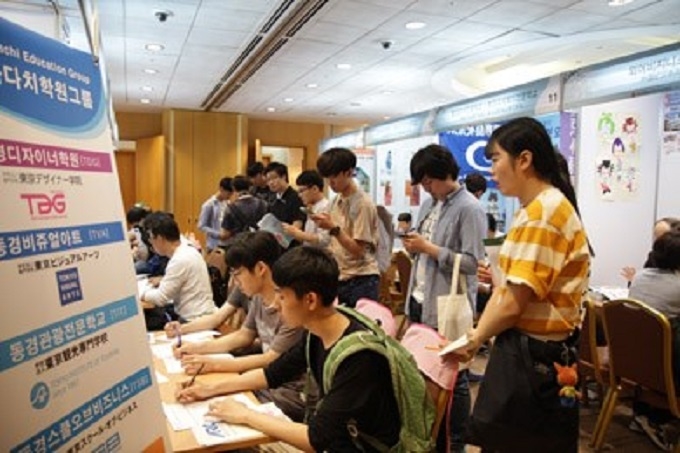 Scenes from the Study in Japan Fair (photo courtesy of the Korean Japanese Association)
Scenes from the Study in Japan Fair (photo courtesy of the Korean Japanese Association)
● Proceeding in the domain of employment
Next I will touch on moving forward in the employment domain. This is a topic with compounding implications, but it also depends on labor market trends. We are in a time during which companies in both Korea and Japan require global personnel, and cross-border employment of highly talented personnel will continue to increase in both countries.
Furthermore, employment after studying abroad has a place at the pinnacle of human exchange because it includes the aspect of establishment and settlement in a new life in the relevant country.
Meanwhile, movement across borders is expected in the technical and service industries as well with the decline in population and aging population in both countries. In addition to employment after studying abroad, experiences in these mutual countries such as technical training, short term language studies, and working holidays may become a vector influencing the occupational choices of young people.
It is on this basis that the Association proposes achieving "the Project to Employ 100,000 People between Korea and Japan". In order to achieve this goal, it is necessary to proactively promote local employment after studying abroad, employment in the host country for learners of the languages of both countries, employment in the host country for the technically skilled, host country employment through overseas internships for students after graduation, and the hiring of employees by individual and joint investment companies in third countries. While all of these measures are feasible in the private sector, they would be further promoted if they received support at the government level.
● Proceeding in the domain of tourism
The third domain of tourism is one in which there is already a great deal of commercial exchange. The annual number of travelers between Korea and Japan reached more than 10 million people in FY2018, but that number has stagnated in recent years due to the Covid-19 pandemic. Luckily, as the pandemic begins to subside, restrictions on entry visas to Japan have been eased as of October 11, 2022, and it has been reported that tourists from Korea are expected to flood the country. Meanwhile, the number of Japanese tourists to Korea, where visas are exempt, is increasing very rapidly by the end of October. Thus, from here on out, the past peak of 10 million tourists is expected to be exceeded.
In quantitative terms, no other domain exceeds tourism in terms of human exchange, and while it involves short stays, it leads to other forms of exchange, such as studying abroad and employment, based on obtaining a correct awareness and understanding of each country.
Particularly, school trips and homestays for middle and high school students are included in the tourism domain, but also possess a qualitative aspect, and it is necessary for each local government to make efforts to expand it. So each local government is expected to combine homestays with the other diverse forms of exchange between both countries in order to expand the grassroots exchange of individuals and families. I believe there is nothing more important in terms of civic exchange than the secondary visits and ongoing exchange with acquaintances that result from homestays.
● Proceeding in the domain of culture
Exchange is already being carried out in a wide range of genres under the fourth domain of culture. This includes numerous genres such as traditional culture, contemporary culture, music, film, animation, food, fashion, and makeup. This can be called one of the frameworks that deepens mutual understanding and friendship at the citizen's level in both Korea and Japan. Countless individuals are working to share culture across numerous genres.
In addition to this, it is necessary to take measures to promote diverse cultural exchange at the individual and club level. If local governments and exchange organizations take the lead by acting as intermediaries for exchange at the citizen's level in each genre, then I expect that cultural activities carried out together or enjoyed together, as a form of experiential exchange based on hobbies and interests, will become invigorated at the citizen's level, rather than the type of cultural activities which are only observed. If we expand this to include youths, families, the middle aged, and senior citizens, then cultural exchange will surely cover a more diverse range of genres.
● Proceeding in the domain of regional exchange
As I mentioned before, the fifth domain of regional exchange involves breaking out of the centralized approach to exchange and striving for exchange between regions and between centers and regions. Local governments in both Korea and Japan already have the foundation required to play the leading role in regional exchange.
Japan has already established the Council of Local Authorities for International Relations, with an office in Seoul, while Korea has the Governors Association of Korea with offices in Tokyo, so I expect them to play a leading role. I believe it makes sense for these organizations to take requests from regional governments and organizations in each country and approach local governments and organizations in the opposite countries regarding possible exchange. In fact, I have heard that the organizations in both countries are already carrying out such activities.
So if local governments take the lead in promoting human exchange at the local level in all the domains, including studying abroad, employment, tourism, culture, regions, and youths, I expect their influence will become immense.
Incidentally, if exchange expands to include local amateur sports clubs, then I expect it will lead to a very interesting phenomenon, and we will see a blossoming in "autonomous sports exchange."
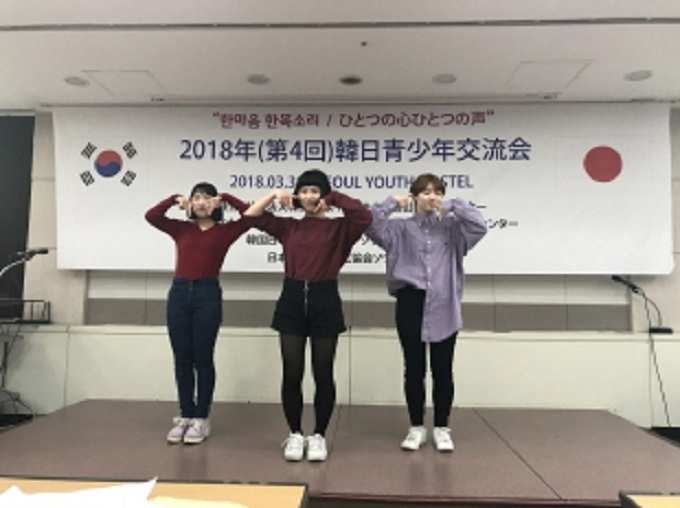 Scene from the Korea-Japan Youth Exchange Meeting (photo courtesy of the Korean Japanese Association)
Scene from the Korea-Japan Youth Exchange Meeting (photo courtesy of the Korean Japanese Association)
3. Future oriented youth exchange
Last but not least, I would now like to discuss youth exchange. I believe that all exchange should be based on an orientation towards the future, but I think it is particularly important to promote youth exchange for younger generations to understand the concept of the new era in Korea-Japan relations. And, based on the value that youth exchange is of the utmost importance, all levels of all domains must cooperate in this area.
At the moment, Japan is slightly ahead in accepting exchange students in the area of official exchange for middle and high school students, but both Korea and Japan are still far behind when compared to Europe, the US, and China. Therefore, it is necessary to develop this domain as part of global education.
Areas such as school trips for middle and high schools, and mutual student exchange, are areas that are feasible if the teachers have the will. Schools tend to be easily influenced by government, but these areas are possible if the schools have courage and a strong sense of values.
Youth exchange is currently carried out across a wide range of domains, but further efforts for grassroots exchange must also be considered. I believe there is a qualitative limit to youth exchange by organizations, currently promoted by the government and other organizations. Therefore, it is necessary to promote grassroots exchange on the middle and high school level or individual/family level.
One approach to this will be for the school to play a central role in organizing a city or community group to encourage homestays for students or families in the opposite country. If local government organizations play an intermediary role in this, it will increase the feasibility of the idea because it will be easier to mutually obtain information.
Another option will be for Japanese language instructors and Korean language instructors at middle and high schools in both countries to promote homestays. Homestays are safe and low cost, and can lead to an expansion of civic exchange of individuals and families from the ground up.
Furthermore, while sports exchange between schools has been less frequent recently, is based on the familiarity of doing something you enjoy together, and is therefore the shortest route to making friends. Therefore, I look forward to exchange in this area, which is highly favored by the students, becoming more popular.
Incidentally, one interesting phenomenon in Korean Japanese youth exchange on the individual level is friendships via online chats sometimes using machine translation to converse in Japanese, Korean, or even English. This area has progressed more than we adults can imagine. I believe that exchange in areas such as these will continue to expand naturally, but it is still necessary for the governments and organizations to take responsibility for increasing exchange opportunities and online communication tools using the Internet and smartphones.
I was not immediately sure what to say when I was asked to give a meaningful lecture to commemorate the receiving of the Japan Foundation Award to the Association, but I am grateful to have been given the opportunity to explain my thoughts on this topic today.
I will finish my lecture today by expressing my hope that a new era will take hold between Korea and Japan in the 21st century, in alignment with the words, the new era in Korea-Japan relations, and that human exchange in a wide range of domains will become popular at the civic level.
Thank you.
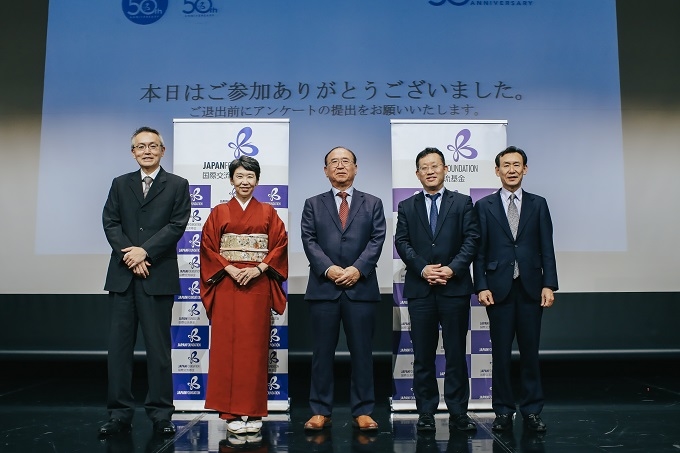 From the Award Commemorative Lecture (photo by Sankei Kaikan)
From the Award Commemorative Lecture (photo by Sankei Kaikan)
October 21, 2022
Lecture at the Korean Cultural Center, Tokyo
Related Articles
Related Events
Keywords
- Culture and Society
- Language
- Education/Children
- Social Community
- The Japan Foundation Awards
- International Conference
- Cultural Diversity
- Peacebuilding
- Japanese Studies
- Japanese-Language Education
- Transboundary/Study Abroad/Travel
- Human Resource
- Cultural Policy/Public Diplomacy
- Republic of Korea
- Japan
Back Issues
- 2023.12. 7 Movie Theaters aroun…
- 2023.6.16 The 49th Japan Found…
- 2023.4.24 The 49th Japan Found…
- 2022.12.27 Living Together with…
- 2022.12.27 Living Together with…
- 2022.8.12 Inner Diversity <…
- 2022.3.31 The 48th Japan Found…
- 2022.3.29 Beyond Disasters - T…
- 2021.11.29 Crossing Borders, En…
- 2021.4.13 Crossing Borders, En…

